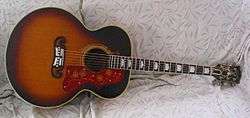Gibson J-200
| Gibson J-200 | |
|---|---|
|
1960 Gibson J-200 | |
| Manufacturer | Gibson |
| Period | 1937-present |
| Construction | |
| Body type | Jumbo |
| Neck joint | Dovetail |
| Woods | |
| Body |
Sitka Spruce top Maple back and sides |
| Neck | Maple |
| Fretboard | Rosewood |
| Hardware | |
| Bridge | Rosewood |
| Colors available | |
| Natural, Black, Vintage Sunburst | |
The Gibson J-200 (Super Jumbo 200) is an acoustic guitar model produced by the Gibson Guitar Corporation.
History
Gibson entered into production of this model in 1937 as its top-of-the-line flat top guitar, initially called the Super Jumbo, changing the name in 1939 to the Super Jumbo 200. It replaced the Gibson Advanced Jumbo.[1] It was made at the Gibson Factory in Kalamazoo, Michigan. The SJ-200 was named for its super-large 16 7/8" flat top body, with a double-braced red spruce top, rosewood back and sides, and sunburst finish. In 1947 the materials used for the guitar changed to maple back and sides. Gibson changed the name to the J-200 in 1955. Due to the weak post-depression economy and wartime austerity, demand for this high-end guitar was very limited and production quantities were small. Early models made from rosewood are highly prized by collectors.
Current models
Gibson currently makes many variations of the J-200. The J-200 Studio is the lowest model in the line, featuring chrome hardware, a plain (non-engraved) pickguard, natural finish and no fingerboard binding, but it retains the inlays, maple back/sides and electronics of the J-200 Standard. It has since been discontinued.
The J-200 Standard is available in sunburst and natural, featuring Fishman electronics, gold hardware, Grover tuners, figured maple back and sides and a three-piece laminate neck (maple/rosewood/maple). It also has a rosewood fingerboard and bridge, an engraved pickguard, and mother-of-pearl crown inlays.
The J-200 Custom is a high-end model, featuring rosewood back and sides (like the original SJ-200s from the 1930s), a rosewood fingerboard and bridge, gold hardware, Grover Imperial tuners, Fishman electronics, an upgraded case, the same three-piece neck as the Standard and Studio, abalone inlays, an engraved pickguard, an older, "script" Gibson logo, and a 'four ribbon bridge' instead of the Standard's 'two ribbon' bridge.
Along with these three are two reissues, the True Vintage (based on the 1950s construction) and the Western Classic Prewar 200, which is similar in specifications to the original early models (rosewood back and sides, ebony fingerboard, block inlays). Gibson also does limited run models, such as the J-200 Koa, the J-200 Trophy, and Montana Gold.
Epiphone produced a more affordable version called the EJ-200, but it is now out of production.[2][3]
References
Citations
- ↑ Wheeler 1992, p. 103.
- ↑ "Epiphone EJ-200". Epiphone.com.
- ↑ "Out of Production".
Sources
- Wheeler, Tom (1992-06-17). "ADVANCED JUMBO". American guitars: an illustrated history. HarperPerennial. ISBN 978-0-06-273154-8. Retrieved 2013-01-28.
External links
| Wikimedia Commons has media related to Gibson J-200. |
